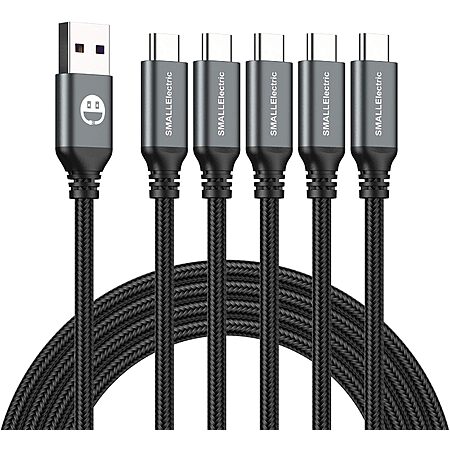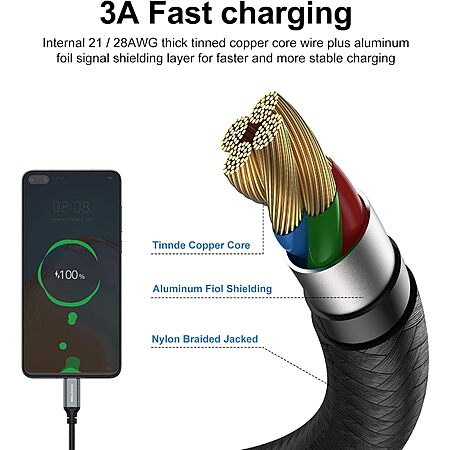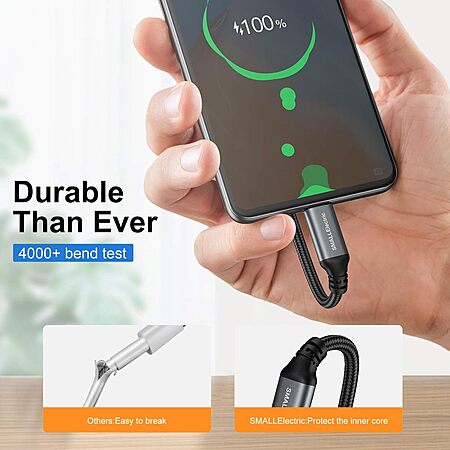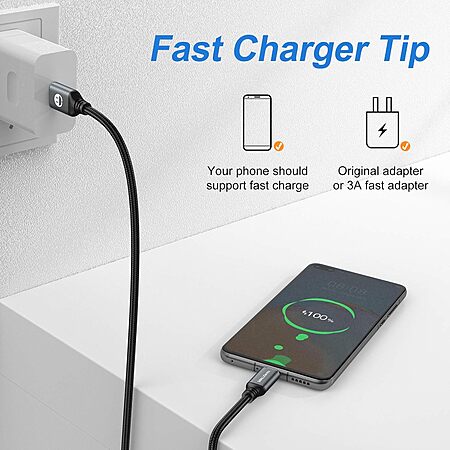expiredNavy-Wife | Staff posted Dec 14, 2024 08:36 PM
Item 1 of 4
Item 1 of 4
expiredNavy-Wife | Staff posted Dec 14, 2024 08:36 PM
5-Pack 6' SmallElectric USB-C to USB-A Braided Fast Charging Cable
$6.50
$18
63% offAmazon
Visit AmazonGood Deal
Bad Deal
Save
Share




Leave a Comment
Top Comments
19 Comments
Sign up for a Slickdeals account to remove this ad.
Our community has rated this post as helpful. If you agree, why not thank texst
Our community has rated this post as helpful. If you agree, why not thank Tuxedo1
Sign up for a Slickdeals account to remove this ad.
Detailed Seller Information
Business Name: ChengDuJuYangFanLingDianZiShangWuYouXianGongSi
Business Address:
静康路399号附1号附1099号
成都市
锦江区
四川省
610000
CN
But because the description for these cables seems to go out of the way to NOT mention voltage specifications at all (they only repeatedly state that they are rated for 3 amps), it is safe to say that these cables are designed for a max of 15W charging. (5V at 3A)
My iPhone will charge using 15V at up to 2A, for 30W of charging power using USB-C PD.So if I used these cables, connected to a USB-A port, my phone would charge significantly slower. (Not just due to only supporting 50% of the maximum power, but there are also advantages gained by the variable voltage for USB-C PD that will be lost.)
My point is, just keep in mind which devices you plan to charge, and if they properly support USB-PD. These cables are still more than enough when it comes to charging my earbuds, PC wireless headset, and a few other devices. Although for all of those devices, I still prefer USB-C to USB-C. Partly because it gives the devices more flexibility for adjusting the power levels (although some still only charge at 5V regardless). But around the house, ever since I updated all of the chargers and cables in every room with "permanent" USB-C charging cables to 240W rated cables, it has been convenient to reduce the total number of cables needed, and (using my phone as an example) already know that any cable I plug it into will support the phone's typical power draw of 15V at 2A when it is mostly empty (and it will reduce power as it charges as part of the battery life optimizations, but the point is the chargers and cables make it work the same everywhere).
And for my MacBook, Windows laptop, a few battery banks, and some other devices that use more power than a phone, every location in the house will charge those as well without me having to worry about labeling all of my cables/chargers with the power ratings anymore. (Well, for now at least. At some point when I have a laptop that supports 240W USB-C PD, not all of my current chargers will handle that yet, but until then I'll enjoy the consistency, since currently I only have a couple of battery banks that will use over 100W
(Side note: I also stopped buying generic brand USB-C cables, due to having a couple that were marketed and sold as 240W rated cables, but in reality are just 100W cables that I guess someone in their marketing department just assumed nobody would notice the difference. So at this point I stick to just a few brands, including Anker. While the price is a bit higher, their power ratings have always been accurate, and in my own experience their reliability has been excellent. Not perfect -- but out of over 100 cables over the years, I have only had one defective cable, and 2-3 cables that failed. But the ones that failed were under very high mechanical stress that exceeded the conditions that any USB cable - or any other copper cable with a similar gague of wire - is designed to be able to handle.)
tl:dr:
I'm clearly a cable snob, but these cables would be sub-optimal for most of my devices. For my devices that can't use more than 15W anyway (earbuds, PC headset, etc.), I would still rather have fewer more expensive cables, opposed to keeping track and labeling all of them. Having 240W rated cables in every location keeps things simple and reduces the total number of cables required. And for the cars (which both use chargers rated for 67W if only one port is in use, and 45W per port for up to 3 ports), I still prefer to just go with cables rated for 240W for consisency.
I apologize for the rambling - these are a good price for many uses. If I didn't already have a lot of older cables, they would be useful for powering various LEGO sets that have third party LED lighting kits installed, as well as some of the LED accent lighting I have on some shelves that have low power consumption. (Although the bulk of the accent lighting is wired directly into larger power supplies, there are a few that still just plug into a couple old USB-A chargers.) But my point is for anyone who already has older USB-A to USB-C cables, these cables will not really offer anything better. But if you are running short on cables, and do not have USB-C power requirements over 5V/3A, these are about as low-cost as they'll get.
Sign up for a Slickdeals account to remove this ad.
Leave a Comment